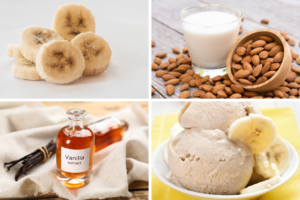“Where do you get your protein?” It’s a popular question that friends, family, or even random strangers on the internet will definitely ask if you even hint that you want to eat less meat.
It’s almost as if they think protein is a rare and elusive nutrient that can only be found in animal products.
But here’s the truth: you don’t need to eat meat to get enough protein.
In this guide, we’ll discuss everything you need to know about getting enough protein on a plant-based diet.
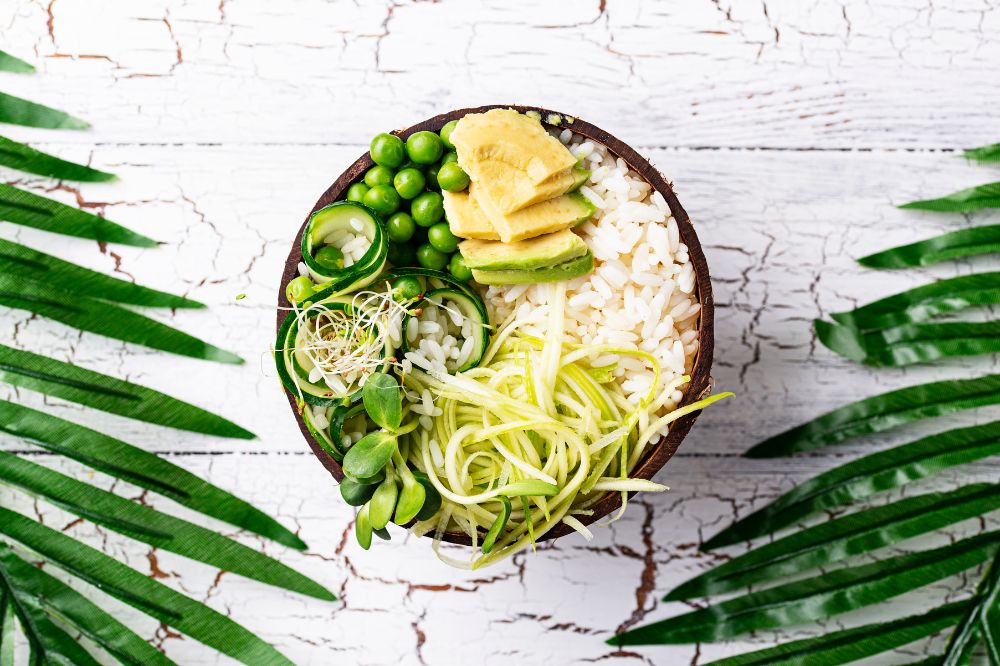
What’s the big deal with protein?
Our bodies need protein. It’s vital for muscles, bones, hormones, and even our immune system.
So yes, if you fail to get enough protein in your diet, your body will suffer the consequences.
Proteins are made of amino acids, kind of like building blocks. Nine of these amino acids are “essential,” meaning we can’t make them ourselves—we gotta eat them.
If we don’t get enough protein, our muscles could get weaker, and that’s not good.
But you don’t have to stress over it; severe protein lack is pretty rare.
According to the NIH, we only need about 0.8 grams of protein per kilogram of body weight.
That’s vegans, omnivores, vegetarians, pescatarians – no matter what diet you choose, we all pretty much need around the same amount of protein from any source.
And you’re not using your current body weight to make this calculation if you’re overweight or obese.
You’d use your ideal weight, what would be considered healthy for your height, age, and sex.
So by this calculation, if you weigh or should ideally weigh 140 pounds, you’d need about 50 grams of protein per day.
Most people rarely require over 60 grams of protein per day – and that’s so easy to get from just plants!
RELATED: What Is TVP (Textured Vegetable Protein)?
Why choose plant protein?
So even though we don’t need a ton of protein to thrive, why would someone choose plant protein over animal protein?
Well, several reasons!
They come with fiber, can help your heart, are lower in fat, have zero cholesterol, plus come with tons of nutrients and minerals that your body also needs anyway (unlike meats and dairy).
Plus, choosing plants helps the planet, too!
How much protein do plant foods offer?
Okay, so most of us need 50-60 grams of protein per day.
How much can you get from plants? The answer: quite a lot!
Many plant-based foods are high in protein and provide essential amino acids.
For example, just one cup of cooked lentils has about 18 grams of protein. That’s nearly 1/3 of your daily needs!
Another excellent source of plant-based protein is quinoa. One cup of cooked quinoa provides approximately 8 grams of protein.
So if you make a hearty quinoa and lentil salad you could potentially knock out half your day’s protein needs in one filling, fibrous meal!
Along with protein, quinoa and lentil salad also provides an abundance of other vital nutrients such as dietary fiber for digestive health, iron for blood cell function, and magnesium for heart and bone health, making it an excellent choice for an all-around nutritious meal.
It’s not hard to get protein from plants.
Knowledge is power and once you know, you know!
RELATED: High-Protein Berry Smoothie Bowl (Vegan Breakfast On The Go)
Do you really need “complete” protein?
The belief that vegans need to carefully combine proteins to get “complete” proteins is a myth.
It comes from a study done long ago in rats, where they found rats grew much more slowly when given plant protein versus animal protein.
But humans aren’t rats!
This just doesn’t stand up when it comes to humans, and this myth was debunked decades ago but it still persists.
The thing is essential amino acids, the building blocks of protein, come from plants and microbes.
Animals don’t manufacture these amino acids either – they also get them from plants!
When we eat food, our bodies don’t process these amino acids as they are.
We consume the food, our body breaks apart the amino acids, then recombines them to generate whatever we need.
Therefore, eating a diverse range of plant foods ensures a balanced amino acid intake.
As long as you have enough of all the essential amino acids swirling around in your body, it doesn’t matter when or how you get them!
Vegans and those on plant-based diets get more than enough protein without special meal planning.
You do NOT need “complete protein” in a single meal or even in a day.
So eat those plants and thrive!
RELATED: 7 High-Protein Soy Curls Recipes That You Won’t Believe Are Vegan
Do vegans need protein powder?
Nope, you can totally get enough protein from plants!
And there are so many different ways to get protein, you don’t have to choose high-protein plant foods that you dislike just because you think they’ll help.
But if you’re absolutely sure you need more protein than your diet allows, protein powder can help.
I personally have a huge gripe with powders and supplements, largely because they’re unregulated and you never know what’s in them.
Getting your nutrients from whole plant foods is so much better!
If you do choose a plant-based protein powder, look for one that is organic, non-GMO, and contains as few ingredients as possible.
The only one I’ve ever bought and felt good about was the Garden of Life brand.
But even still, I only used this at the very beginning of my plant-based journey because I was still buying into the hype that veggies weren’t enough!
I promise there’s generally no need for you to use a protein powder.
Just eat enough plants.
But if you must, try Garden of Life!
It’s a good choice.
Plant protein sources
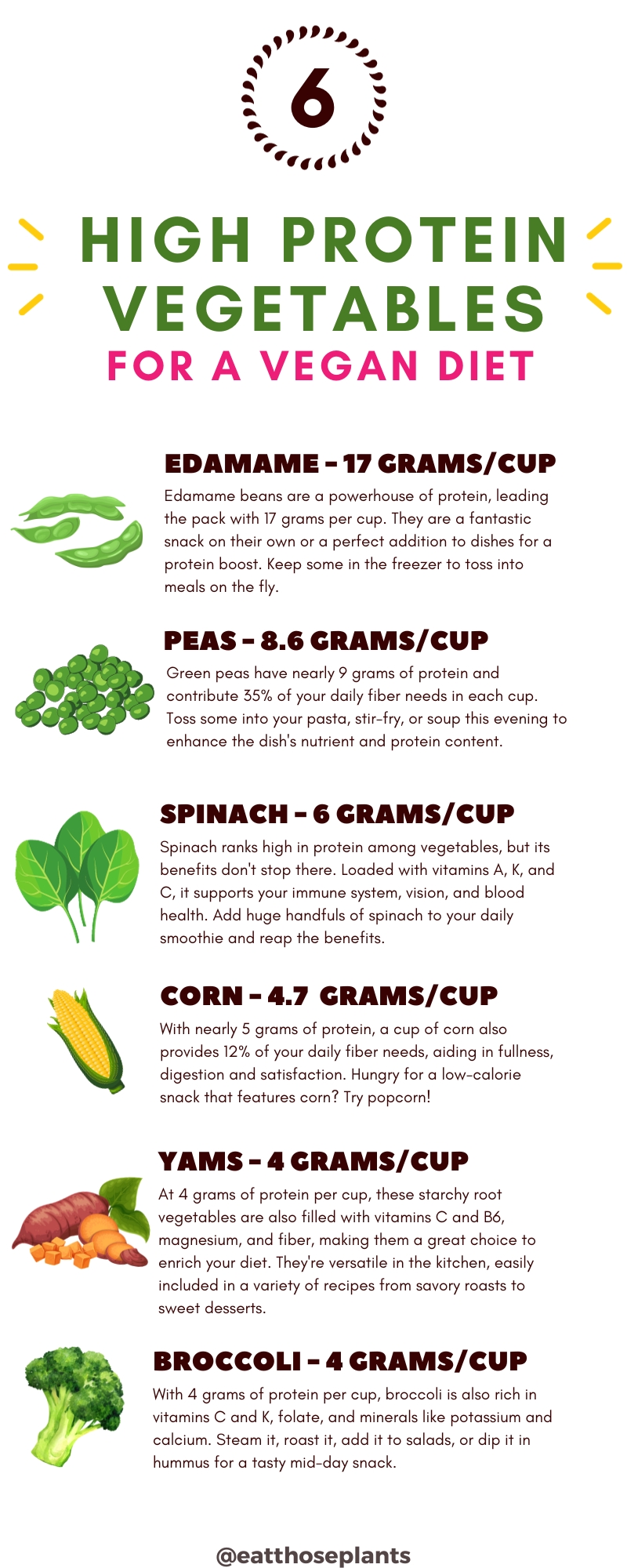
Just eating enough food usually means enough protein. But here’s a list of some top-notch vegan protein foods:
Beans & Legumes
- Chickpeas: 11.6 grams per cup
- Lentils: 18 grams per cup
- Peanuts: 11.5 grams per third cup
- Black beans: 15.2 grams per cup
- Edamame: 17 grams per cup
- Soybeans (cooked): 22 grams per cup
Soy & Mock Meats
- Tempeh: 15.4 grams per half cup
- Tofu: 10.2 grams per half cup
- Textured Vegetable Protein (TVP): 12.5 grams per quarter cup (dry)
- Seitan (wheat gluten): 21 grams per 3 ounces
- Soy curls: 10 grams per ounce (dry)
Nuts & Seeds
- Hemp seeds: 9.9 grams per quarter cup
- Almonds: 7.6 grams per quarter cup
- Pumpkin seeds: 8.5 grams per quarter cup
Grains & Pseudograins
- Quinoa: 8 grams per cup (cooked)
- Wild rice: 6.5 grams per cup (cooked)
- Chickpea pasta: 11 grams per 2 ounces (dry)
- Farro: 12 grams per cup (cooked)
Veggies
- Green peas: 8.2 grams per cup
- Broccoli: 3.6 grams per cup
- Green peas: 8 grams per cup
- Spinach: 6 grams per cup
RELATED: High-Protein Italian Stuffed Portabella Mushroom
High-protein plant-based meal plan
To help illustrate how simple it can be to get your protein from plants, I put together a sample 3-day meal plan!
Take a look and see how delicious and satisfying plant-based meals can be while still meeting your protein needs.
Day 1: Total Protein ~55 grams
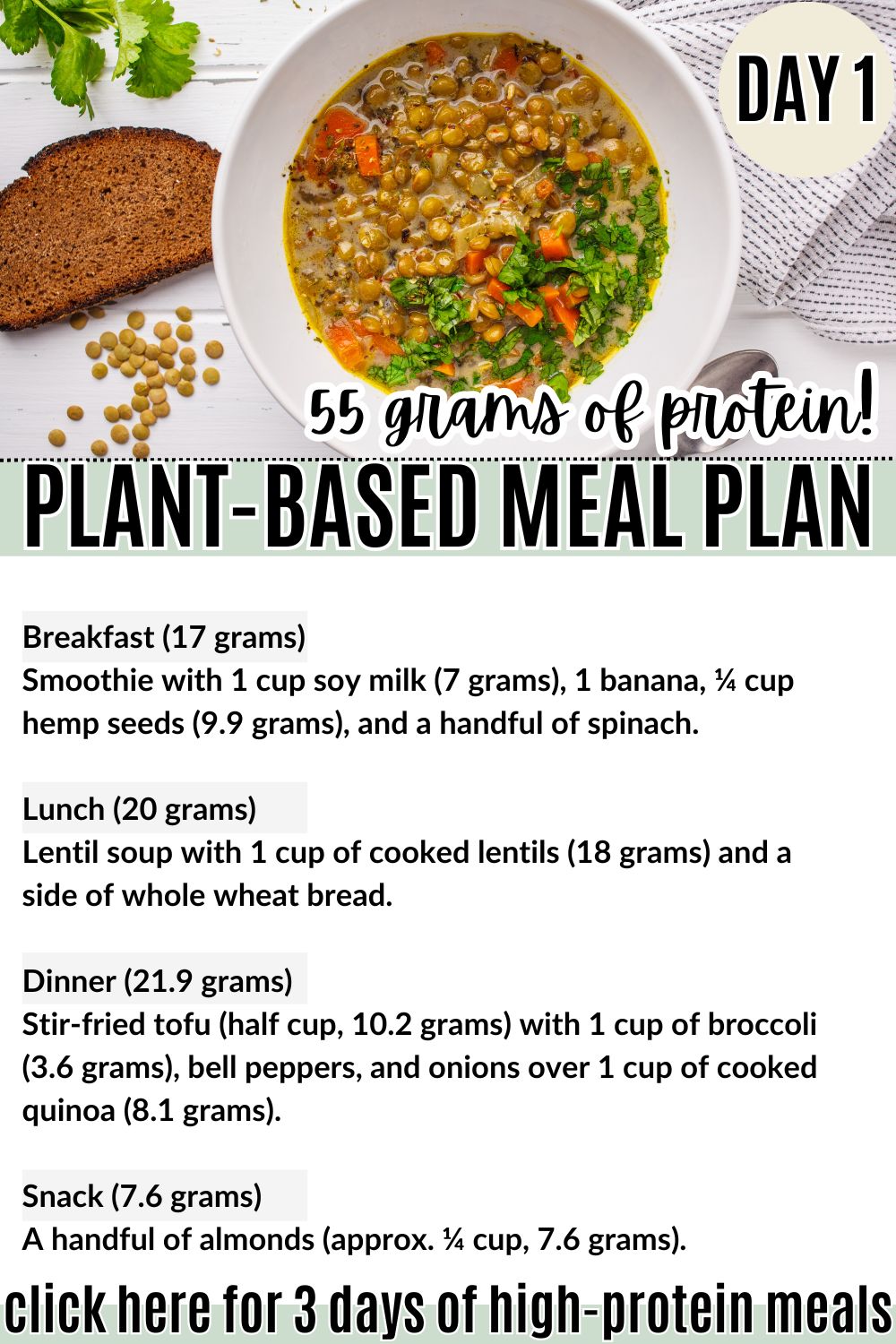
- Breakfast: Smoothie with 1 cup soy milk (7 grams), 1 banana, ¼ cup hemp seeds (9.9 grams), and a handful of spinach.
Total Protein: ~17 grams - Lunch: Lentil soup with 1 cup of cooked lentils (18 grams) and a side of whole wheat bread.
Total Protein: ~20 grams - Dinner: Stir-fried tofu (half cup, 10.2 grams) with 1 cup of broccoli (3.6 grams), bell peppers, and onions over 1 cup of cooked quinoa (8.1 grams).
Total Protein: ~21.9 grams - Snack: A handful of almonds (approx. ¼ cup, 7.6 grams).
Total Protein: ~7.6 grams
Day 2: Total Protein ~57 grams
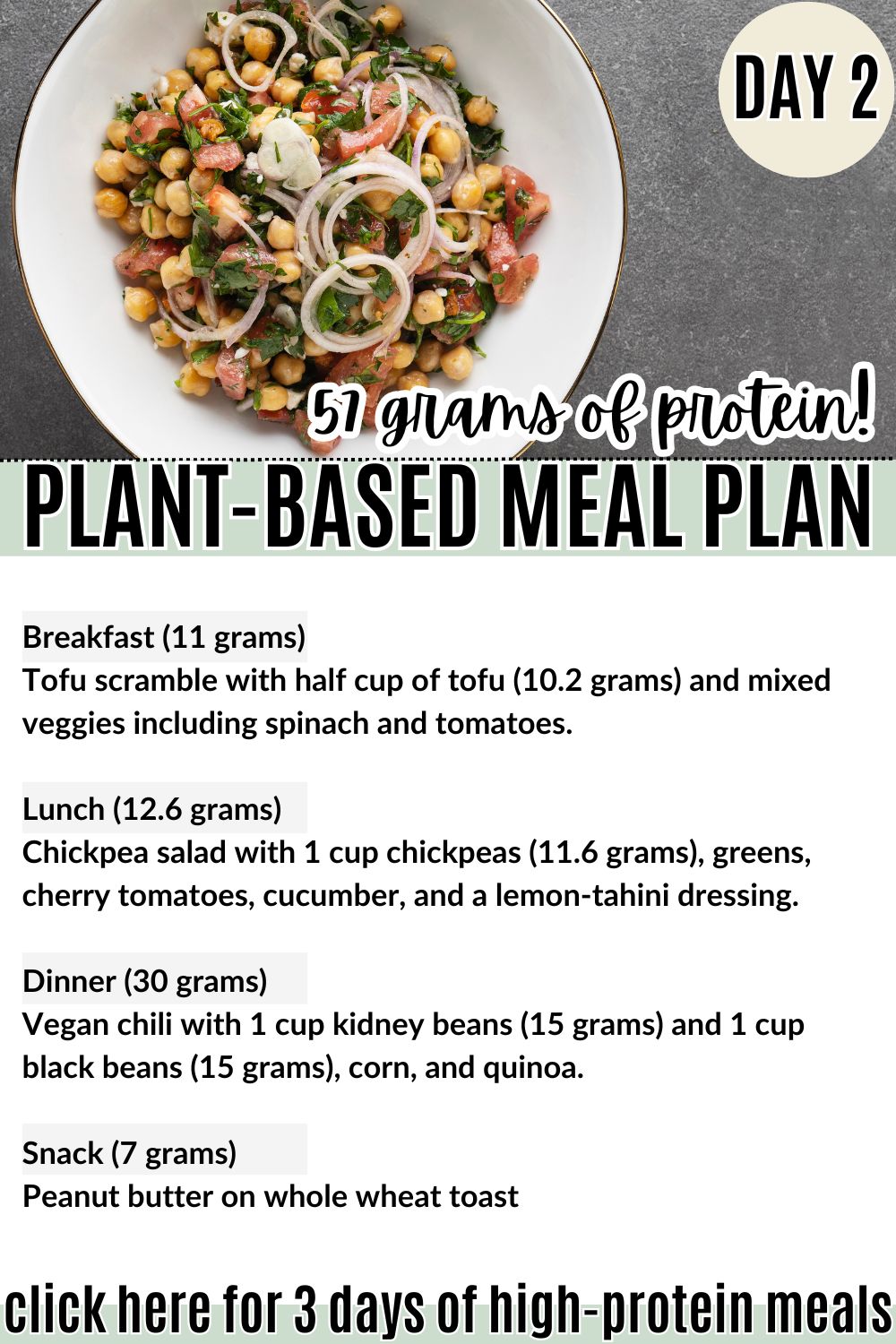
- Breakfast: Tofu scramble with half cup of tofu (10.2 grams) and mixed veggies including spinach and tomatoes.
Total Protein: ~11 grams - Lunch: Chickpea salad with 1 cup chickpeas (11.6 grams), mixed greens, cherry tomatoes, cucumber, and a lemon-tahini dressing.
Total Protein: ~12.6 grams - Dinner: Vegan chili with 1 cup kidney beans (15 grams) and 1 cup black beans (15 grams), corn, and quinoa.
Total Protein: ~30 grams - Snack: Peanut butter on whole wheat toast (2 tablespoons peanut butter, 7 grams).
Total Protein: ~7 grams
Day 3: Total Protein ~52 grams
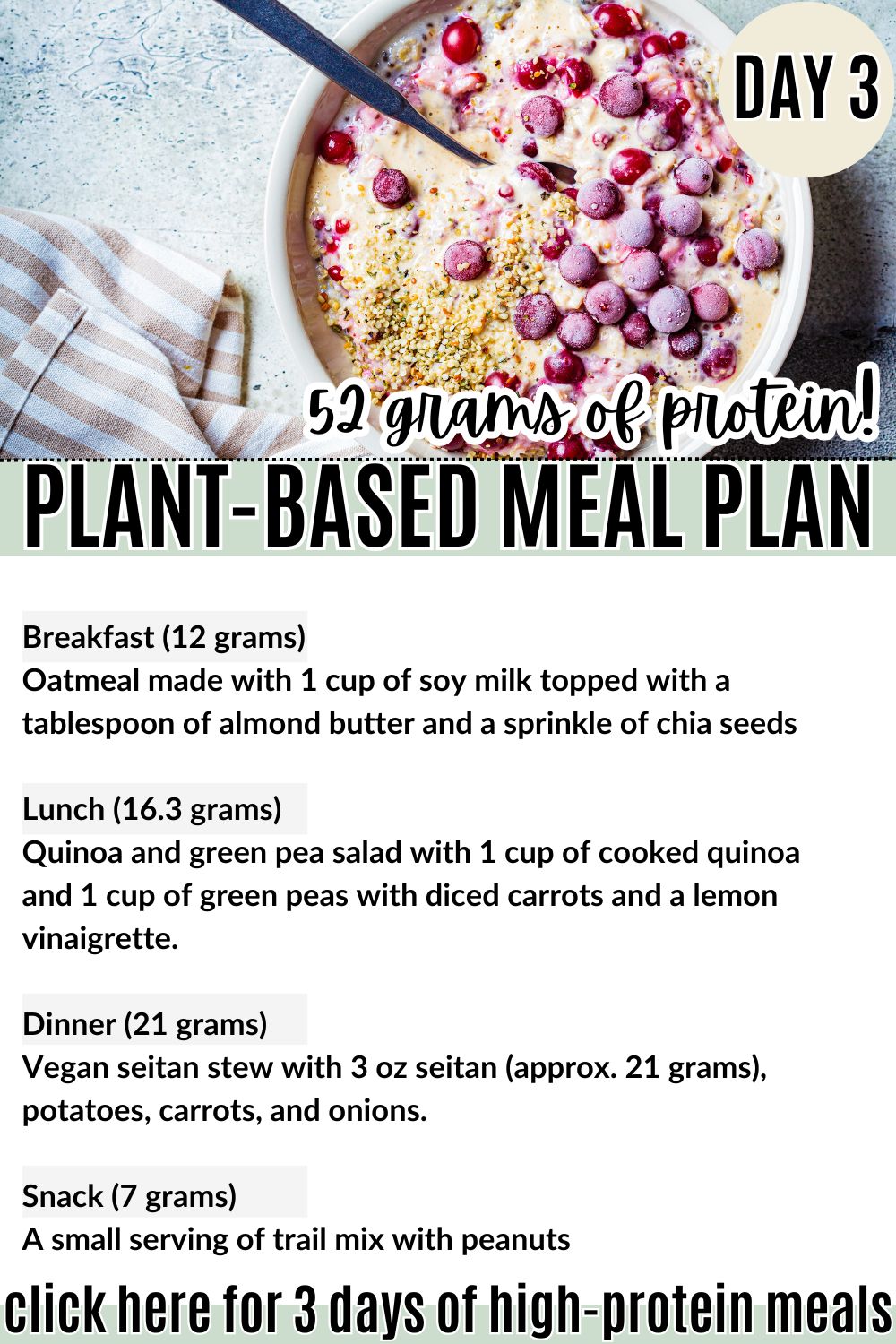
- Breakfast: Oatmeal made with 1 cup of soy milk (7 grams) topped with a tablespoon of almond butter (approx. 3.5 grams) and a sprinkle of chia seeds (1.6 grams for 1 tablespoon).
Total Protein: ~12.1 grams - Lunch: Quinoa and green pea salad with 1 cup of cooked quinoa (8.1 grams) and 1 cup of green peas (8.2 grams) with diced carrots and a lemon vinaigrette.
Total Protein: ~16.3 grams - Dinner: Vegan seitan stew with 3 oz seitan (approx. 21 grams), potatoes, carrots, and onions.
Total Protein: ~21 grams - Snack: A small serving of trail mix with peanuts (2 tablespoons, 5.75 grams).
Total Protein: ~5.75 grams
These meal plans are examples of how a balanced vegan diet can meet daily protein needs without relying on animal products.
They include a variety of plant proteins throughout the day, ensuring a good mix of amino acids and other nutrients, taste great, and keep you feeling full and satisfied!
Wrapping it up
Worried about protein as a vegan? Don’t be.
There are loads of plant-based options that have plenty of protein to meet all your body’s needs.
What’s your go-to protein source?
Drop a comment, share this with friends, and save this info for later!


